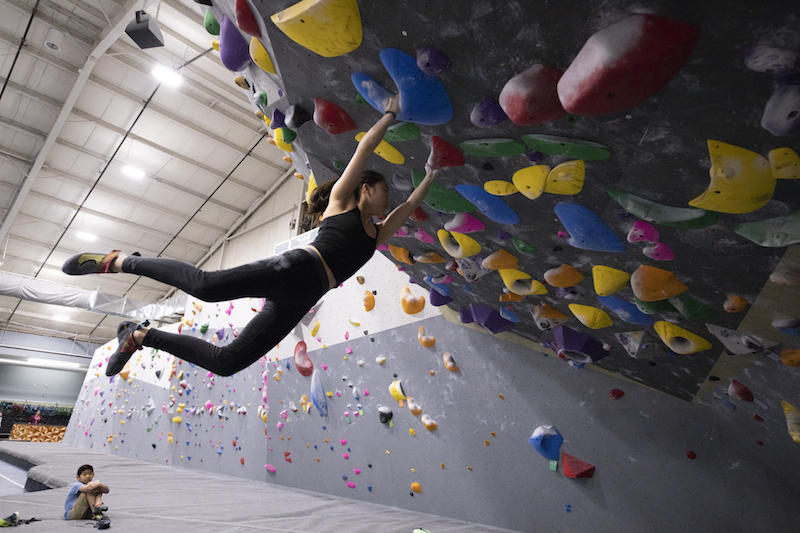Rock climbing is an exceptional workout that strengthens and tones the entire body. Rock climbing targets multiple muscle groups and improves cardiovascular endurance.
Rock climbing is an increasingly popular activity that offers more than just physical challenges. It requires both physical and mental strength to scale mountains and rock walls. As a result, it provides numerous benefits to anyone who participates in the sport.
Rock climbing can increase strength, flexibility, balance, and agility. It is also a great way to improve cardiovascular health. In addition to the physical advantages, rock climbing can help reduce stress, improve focus, and boost self-confidence. Whether you are climbing indoors or outdoors, rock climbing is an excellent way to push yourself and achieve your fitness goals.

Credit: www.mensjournal.com
The Physical Benefits Of Rock Climbing
Overview Of The Physical Benefits Of Rock Climbing
Rock climbing has become one of the most sought-after forms of exercise. The sport offers several physical benefits, including muscle building, aerobic fitness, and improvement of overall physical strength and agility.
Discussion Of The Cardiovascular Benefits Of Rock Climbing
Rock climbing can help you maintain a healthy cardiovascular system. During a climb, your heart rate increases, which leads to a workout that can match any gym session. Additionally, it can lower your blood pressure and improve your metabolism.
- Climbing helps to build endurance, especially for high-altitude climbing due to the intensity of the workout.
- This can be a way to improve blood flow, promote healthy cholesterol levels, and prevent heart disease.
Highlight Of The Muscle Groups Targeted During Rock Climbing
Rock climbing is an excellent way to work out multiple muscle groups in the body. It targets primarily the upper body and requires a lot of strength, stamina, and endurance.
- Climbing requires significant upper body strength, including forearms, shoulders, back, and biceps.
- Additionally, while moving your legs and feet, it helps in toning core muscles as well as lower body muscles, including legs, glutes, and calf muscles.
Explanation Of How Rock Climbing Can Improve Balance And Coordination
Rock climbing requires a great deal of body control and coordination. When you climb, your hands and feet must work together, and this can enhance your coordination.
- The varying terrain and inclines that are found while climbing involve balance as well as muscle control.
- Climbing utilizes both fine and gross motor skills, which can be especially beneficial for individuals with motor-control impairments.
Research-Based Evidence Supporting The Physical Benefits Of Rock Climbing
Several studies have shown that rock climbing improves muscle strength, cardiovascular health, endurance, and body composition. According to a research review by the asian journal of sports medicine, rock climbing:
- Helps develop a lean body mass by burning calories while building muscle.
- Improves overall fitness and agility, leading to better coordination and balance.
- The intensity of climbing makes it a highly efficient form of exercise for cardiovascular health.
Rock climbing is an effective workout that can help build muscle, improve cardiovascular health, strengthen multiple muscle groups, advance coordination and balance, and contribute to overall fitness and agility.
The Mental Benefits Of Rock Climbing
Overview Of The Mental Benefits Of Rock Climbing
Rock climbing is not only a great physical workout but also has a profound impact on one’s mental wellbeing. The activity involves problem-solving, facing challenges, and overcoming fears, which all contribute to the development of mental toughness. Here are some of the mental benefits of rock climbing.
Discussion On The Impact Of Rock Climbing On Stress Reduction And Anxiety Relief
Rock climbing is an excellent stress buster and helps in relieving anxiety. Some ways in which this happens are:
- The release of endorphins in the body due to physical exertion, which improves mood and reduces stress levels.
- The rhythmic breathing required for rock climbing helps calm the mind and body.
- The focus and concentration required in the activity help in taking the mind off worries and forcing it to stay in the present moment.
Highlight On The Role Of Problem-Solving Skills Development In Rock Climbing
Rock climbing requires problem-solving skills and the ability to analyze situations. Each climb is a puzzle that needs to be solved, and climbers need to identify the most efficient way to climb the terrain. The activity helps in:
- Developing creative problem-solving skills as there is no one fixed solution to approach a climb.
- Improving critical thinking skills as climbers need to make quick decisions while climbing.
- Enhancing spatial awareness and hand-eye coordination.
Explanation On How Overcoming Challenges In Rock Climbing Can Boost Confidence And Self-Esteem
Rock climbing requires facing challenges and pushing oneself to overcome fears. The activity helps in:
- Boosting confidence as each successful climb provides a sense of accomplishment.
- Improving self-esteem by pushing one’s limits and exceeding expectations.
- Developing resilience and the ability to bounce back from failures, which is an essential life skill.
Research-Based Evidence Supporting The Mental Benefits Of Rock Climbing
Several studies have supported the mental benefits of rock climbing, including:
- A study published in the journal of health psychology found that indoor rock climbing can reduce symptoms of depression.
- Another study published in the journal of applied sport psychology found that rock climbing can enhance mental toughness, problem-solving abilities, and stress management skills.
- The american alpine club reported that 88% of climbers found that the activity had a positive impact on their mental wellbeing.
Overall, rock climbing is a unique activity that challenges both the mind and body. It has several mental benefits, including stress reduction, problem-solving skills development, and confidence and self-esteem building.
Best Practices For Rock Climbing Workouts
Rock climbing is a physically and mentally demanding activity that can provide a full-body workout. However, to get the maximum benefits, rock climbers need to follow best practices that ensure a safe and effective workout. In this section, we’ll discuss some essential things that you need to consider before starting a rock climbing workout, the necessary gear, warm-up and cool-down exercises, and research-based evidence supporting the effectiveness of following these best practices.
Overview Of The Best Practices That Rock Climbers Can Follow To Maximize The Physical And Mental Benefits Of Rock Climbing
- Start slowly and gradually increase the difficulty level
- Ensure proper technique and form
- Focus on strength and endurance training
- Incorporate cross-training activities
- Listen to your body and take rest when needed
Discussion On How To Start Rock Climbing Safely
Before starting any physical activity, including rock climbing, it’s crucial to consult with a healthcare professional to ensure your fitness level. Here are some tips to start rock climbing safely:
- Join a beginner-friendly climbing gym or hire an experienced instructor
- Always wear a proper harness, helmet, and climbing shoes
- Learn the essential knots and belaying techniques
- Begin with established routes and gradually move to a more challenging level
Highlight Of Essential Gear For Rock Climbing
Rock climbing requires some specific gear that ensures your safety and makes the activity more comfortable. Here are the necessary items:
- Climbing shoes
- Harness
- Chalk bag and chalk
- Helmet
- Belay device
- Quickdraws
- Ropes
Explanation Of Recommended Warm-Up And Cool-Down Exercises
Before starting your rock climbing workout, it’s essential to do a proper warm-up to prevent the risk of injury and ensure your muscles are prepared for the activity. Here are some warm-up exercises:
- Cardio exercises like jogging or cycling
- Dynamic stretches like high knees and lunges
- Shoulder rotations and wrist circles
Similarly, cool-down exercises are essential to regulate your body temperature and prevent soreness. Here are some examples:
- Static stretches like hamstring and quad stretches
- Light cardio exercises like walking
- Relaxation exercises like deep breathing
Research-Based Evidence Supporting The Effectiveness Of Following Best Practices For Rock Climbing Workouts
Research has shown that following best practices like proper technique and form, gradual progress, and focus on strength training can provide numerous physical and mental benefits. Rock climbing can improve cardiovascular health, increase strength and endurance, reduce stress, and boost self-confidence.
Additionally, cross-training activities like yoga and weightlifting can enhance the benefits of rock climbing and reduce the risk of injury.
By following these best practices, you can make your rock climbing workout safe and effective, providing maximum physical and mental benefits. However, always listen to your body, and if you feel uncomfortable or experience any pain, stop immediately and consult with a healthcare professional.
Keep in mind that rock climbing requires patience, perseverance, and discipline, and it takes time to see progress.
Frequently Asked Questions For Is Rock Climbing A Good Workout?
Is Rock Climbing A Good Full-Body Workout?
Yes, rock climbing is an excellent full-body workout that targets all major muscle groups.
How Many Calories Can You Burn While Rock Climbing?
Rock climbing can burn anywhere from 500 to 900 calories per hour depending on the intensity.
Is Rock Climbing Suitable For Beginners?
Yes, rock climbing can be suitable for beginners. Start with an indoor climbing gym and take lessons to improve skills.
Conclusion
Rock climbing is a unique sport that combines strength, endurance, and mental toughness. The benefits of this sport extend far beyond the physical aspect. Studies have shown that rock climbing can improve a person’s critical thinking, creativity, and problem-solving skills.
It also helps to build self-confidence and promotes a sense of community. Rock climbing is an excellent workout for those looking to improve their overall fitness level. It challenges the body to move in ways that traditional gym workouts do not.
Whether you are a beginner or an experienced climber, rock climbing is a great activity to incorporate into your fitness routine. So, if you’re looking for a fun and challenging workout that offers both physical and mental benefits, grab your gear and hit the wall!




